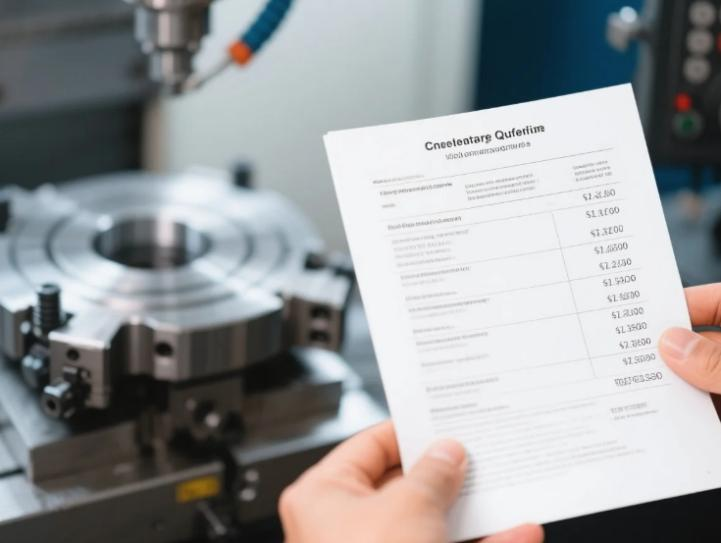Hai mai richiesto preventivi a più fornitori di tornitura CNC e ricevuto prezzi molto diversi? Non sei il solo. Come ingegnere di produzione che ha analizzato migliaia di preventivi, ti spiegherò quali sono i fattori che causano queste differenze e come evitare di pagare troppo. in realta '... determinano queste differenze e come evitare di pagare troppo.
7 Fattori Principali Che Determinano il Tuo Preventivo
1. Costo dei Materiali: La Variabile Più Importante
- Metalli come titanio o acciaio inox costano da 3 a 5 volte di più dell'alluminio.
- Le plastiche (ad esempio PEEK) possono costare il 40% in meno rispetto ai metalli, ma richiedono velocità di lavorazione più lente, influenzando i tempi.
- Suggerimento professionale: Utilizza l'alluminio 6061 per i prototipi: costa il 60% in meno delle leghe di qualità aerospaziale e si lavora più velocemente.
2. Complessità: Geometria = $$$
- Un componente che richiede lavorazione a 5 assi costa il doppio rispetto a uno realizzato su un centro di lavoro a 3 assi.
- Cavità profonde (>4× diametro dell'utensile) o pareti sottili (<0,5 mm) aumentano le percentuali di scarto del 15–30%, facendo salire i prezzi.
- Risolvilo: Arrotondare gli angoli interni (≥⅓ della profondità della cavità) per prevenire la rottura degli utensili e ridurre i tempi di lavorazione.
3. Quantità: Ordini in Bulk Riducono i Costi
- Ordini più di 100 unità? Il costo per unità diminuisce del 30–50% grazie al ammortamento delle spese di configurazione .
- Piccoli lotti (<10 pezzi) pagano il 70% del costo in programmazione e attrezzaggio.
4. Tolleranze: La Precisione Ha un Prezzo
- Mantenere ±0,025 mm invece di ±0,05 mm può aggiungere il 20–40% al preventivo a causa dell'utilizzo di utensili specializzati e controlli di qualità.
- Chiedi: "Quale tolleranza è in realta '... necessaria?" Specifiche meno strette = consegna più rapida.
5. Finiture superficiali: non esagerare con le specifiche
- Una finitura di base fresata (Ra 3,2μm) è inclusa. Anodizzazione o lucidatura aggiunge il 15–25%/pezzo.
- Esempio: A meno che non si tratti di un prodotto per il consumatore, evita la lucidatura estetica: raramente influisce sulle funzionalità.
6. Costi fissi dei fornitori: contano la posizione e la tecnologia
- Le aziende negli Stati Uniti/UE chiedono 75–150/ora; le fabbriche cinesi partono da 75–150/ h i nostri ;Chinesefactoriesaverage 25–50 .
- I negozi con cambiatori di utensili automatizzati riducono i costi di manodopera del 20% .
7. Costi Nascosti: Occhio a Questi
- Strumentazione: Gli appoggi personalizzati aggiungono 100–100– 500 .
- Spedizione: Spedizione aerea accelerata? È un +30% .
- Sovrapprezzi per quantitativi minimi: Gli ordini inferiori a 50 unità spesso includono costi per piccole serie .
Come Fornitori In realta '... Calcola il tuo preventivo
La maggior parte dei negozi utilizza uno di questi modelli:
- Tariffa oraria: 65–65– 120/ora (comune per prototipi).
- Prezzo a pezzo: 10–10– 100+/unità (migliore per lotti >100).
- Modello ibrido: Tariffa di configurazione + costo inferiore per unità (ad es., 500 setup + 500 impostazione + 8/parte).
Bandiera rossa: Citazioni senza ripartizione per voce spesso nascondono dei margini.
5 modi per ridurre i costi della macchina (senza sacrificare la qualità)
1.Semplificare i disegni
- Sostituite gli angoli affilati con i raggi per evitare strumenti personalizzati.
- Evitare le caratteristiche che richiedono > 3 orientamenti della macchina.
2.Scambi di Materiale
- Passare dall'acciaio inossidabile 304 al 303: stessa resistenza alla corrosione, lavorazione 25% più veloce.
3.Ordina per Lotti
- Combina più parti in un unico ordine per condividere i costi di configurazione.
4.Gestisci le Tolleranze
- Solo le caratteristiche critiche richiedono specifiche strette. Allentare le altre a ±0,1 mm.
5.Scegli il Fornitore Giusto
- Per i prototipi: scegliere fornitori con strumenti di quotazione istantanea.
- Per la produzione: fabbriche con celle automatizzate a 5 assi.
tendenze dei Prezzi nel 2025: Quali Saranno?
- Preventivi Basati sull'Intelligenza Artificiale: Aspettati applicazioni per prezzi in tempo reale che tengano conto dei futures sui materiali.
- Impatto dell'automazione: Le celle CNC robotiche ridurranno i costi di manodopera del 15% entro il 2026.
- Volatilità dei materiali: I prezzi dell'alluminio potrebbero oscillare ±12% a causa degli spostamenti nella catena di approvvigionamento.
✅ Conclusione chiave
I preventivi CNC variano perché i fornitori valutano materiale + complessità + quantità + costi generali in modo diverso. Per evitare di pagare troppo:
“Semplifica il tuo design, specifica solo essenziale tolleranze e richiedi sempre una suddivisione dettagliata del preventivo.
Hai ricevuto un preventivo confuso? Mandami un messaggio: ti aiuterò a comprenderlo.


